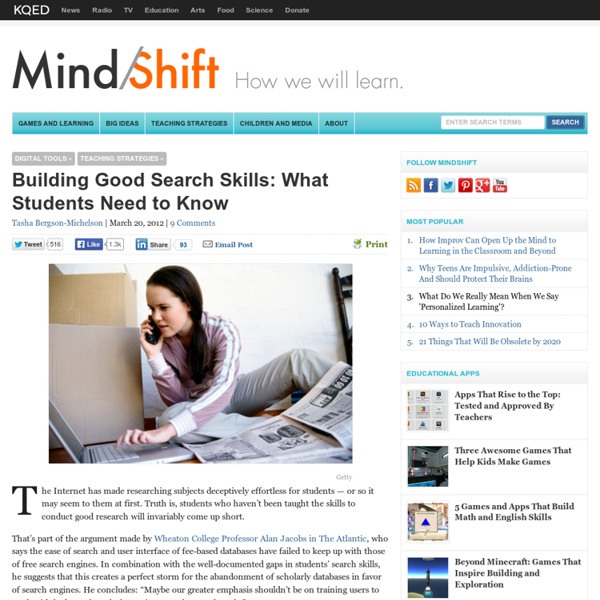Field Trip Library
Project Gutenberg - free ebooks
Buck Goldstein: Academia at a Crossroads -- Can Our Great Universities Lead in a Time of Need
Pulitzer Prize winner David Rohde's recent article on our efforts at UNC to turn our university into an engine of innovation argues that America's research universities can make a profound difference in the battle to rebuild the country's economy and its middle class. With over 250 billion in endowment, research universities are the crown jewels of our society. Rhode's plea that these magnificent institutions do more to generate economic activity while attacking society's biggest problems mirror arguments my co-author Holden Thorp and I make in our book. Criticism comes from two directions. Successfully responding to internal criticism of efforts to increase the impact of universities requires a more nuanced approach. David Rohde's article provides a clear suggestion for increasing the impact of a relatively small number of great American institutions.
The 33 Digital Skills Every 21st Century Teacher should Have
By EdTech Team Updated on march 2, 2015 : The original list that was created in 2011 comprised 33 skills , after reviewing it we decided to do some merging and finally ended up with the 20 skills below. The 21st century teacher should be able to : 1- Create and edit digital audio Here are some tools for teachers to develop this skill :Free Audio Tools for Teachers 2- Use Social bookmarking to share resources with and between learners Here are some tools for teachers to develop this skill : A List of Best Bookmarking Websites for Teachers 3- Use blogs and wikis to create online platforms for students Here are some tools for teachers to develop this skill : Great Tools to Create Protected Blogs and Webpages for your Class 4- Exploit digital images for classroom use Here are some tools for teachers to develop this skill :Web Tools to Edit Pictures without Installing any softwareTools to Convert Photos into Cartoons
Not So Distant Future — technology, libraries, and schools
Advanced Fiction Writing: The Best Books On How To Write A Novel
There are zillions of books on writing, and many are listed in the catalog of the Writers’ Digest Book Club. I have a whole shelf of them. Many of them turned out to be excellent compost. Some of them have proven useful. The following are the ones I think you’ll find most useful, with links to Amazon where you can buy them right now. The Most Wished For book in the Fiction Writing Reference category on Amazon is Writing Fiction for Dummies, the complete guide for writing and selling your novel. A classic textbook on writing by one of the master teachers of fiction writing. A summary of the fiction writing wisdom of Sol Stein, the legendary editor, writer, and teacher. A very useful guide for learning the craft of fiction writing. A massively popular book on how to write a massively popular novel by upping your fiction writing game. A recent book on story structure that will teach you everything you need to know about the three-act structure and a whole lot more.
What’s On the Horizon in Higher Education
Big Ideas Culture Digital Tools Teaching Strategies Flickr: Dexterwas How will college life be different in five years than it is today? In its recently released 2012 NMC Horizon Report on Higher Education, New Media Consortium predicts there may be more gesture-based computing, and lots of inter-connected (and Internet-connected) objects packed with useful information. Video games will become more commonplace in classrooms, and Big Data will drive big decisions on the part of students, faculty, and the foundations and companies in the education sphere. The Horizon Report crystallizes a lot of what we’re witnessing in education. What the report does focus on are six technologies to watch, categorized in the near, middle, and foreseeable future. 1. 2. 3. 4. 5. 6. MOBILE APPS. Some institutions are creating programs to teach student entrepreneurs how to create apps from scratch and to market them. Flickr:Chirantan Patnaik TABLET COMPUTING. GAME-BASED LEARNING. LEARNING ANALYTICS. Daniel Choo
The Prepared Graduate:The Essential Cognitive Backpack
Sally was a diligent, determined honor student at her suburban high school. She applied her sharply focused mind to attain consistently praiseworthy results on examinations, and she was awesome in her precise recall of scientific facts, important dates in history, and mathematical processes. The reports that she wrote for various subjects were usually compilations of tightly organized snippets of information that she had found on the Internet and repackaged. But now that she is a freshman at a leading state university, Sally's academic performance is in a state of alarming decline. Back in high school, Sally succeeded by deploying her outstanding rote memory. In-Depth Understanding Many students struggle in college because they have trouble decrypting the content in courses like Physical Chemistry, Renaissance Poetry, and Political Theory. To avoid this problem, high school classes in many different subject areas should groom students to become indepth analysts and interpreters.
The 8 Pillars of Digital Literacies
May 21, 2014 Edudemic has recently published this wonderful visual that outlines the eight elements of digital literacy. I am posting below for those of you who haven't seen it yet. Essential Elements of Digital Literacy "Cultural – Look at the context in which the literacy is situatedCognitive – How do we think when we are using a device (vs when we are not)?



